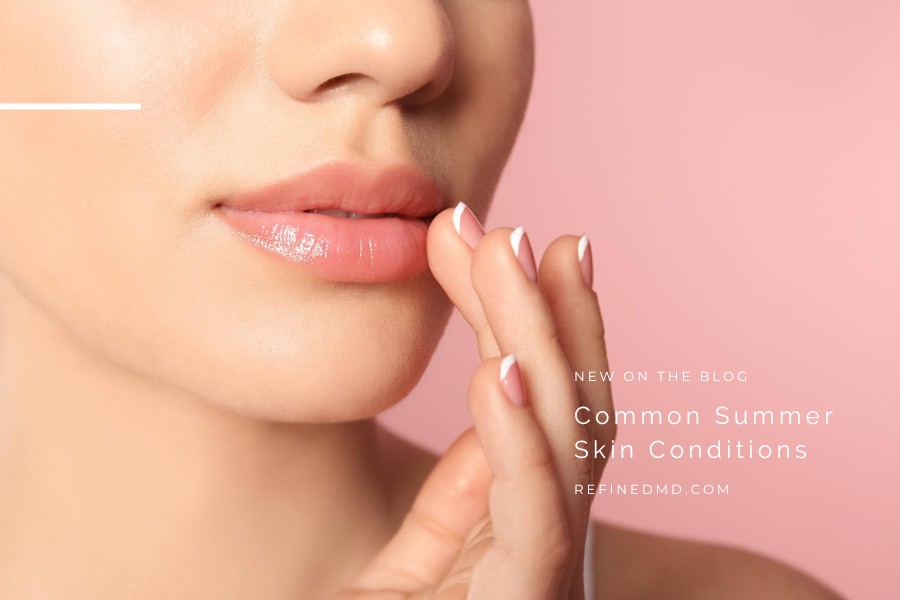
14 Jul Common Summer Skin Conditions
Have you booked your dermatology appointment for the year? Schedule yours at RefinedMD now so you can catch any unusual moles before they get out of hand—and also to manage common summer skin conditions. Acne can really flare up in the warmer months thanks to bacteria that causes this condition mixing with sweat and extra skin oil. That’s a cocktail for clogged pores and, in turn, breakouts. Best practices to prevent acne in the summer include regularly blotting sweat off of the skin, always wash sweaty clothes, hats, and towels before wearing them again, and make sure you’re using topicals that won’t clog the pores. Still, even with these tips, acne happens and over the counter solutions don’t work for everyone. We have the medical-grade topicals and treatment to get acne under control.
Contrarily, you might struggle with dry and irritated skin in the summer. Excessive air conditioning might be the culprit, but no matter the cause having dry skin is no fun. Make sure you shower and wash your hair right after getting out of any pool. Always apply medical-grade sunscreen whenever you’re exposed to UV rays. Medical-grade moisturizers are also a must year-round for all skin types. Still not helping? You might need an in-office treatment and skin regimen upgrade to give your skin the hydration it needs.
Skin Tips
Folliculitis is a common summer bummer. When hair follicles are infected, this condition can occur. They can look like pimples, but are usually itchy and more sensitive. You can help prevent folliculitis by getting out of workout clothes and showering as soon as you’re done sweating. Avoid hot tubs when you can, especially if you don’t know the chlorine and acid levels. Aim for light-weight, loose clothes when you’re in the heat. Also remember that summer manis and pedis can cause a myriad of conditions, including folliculitis. If you notice anything strange about your skin, schedule a derm appointment right away.
Melasma also becomes more prevalent in the summertime. It’s a type of hyperpigmentation especially common in pregnant people, but it can also be triggered by the sun. It often presents as a gray or brown “mask” but can be anywhere on the body. It’s one of the toughest hyperpigmentation lesions to treat, but the right laser can often help lessen it until it eventually goes away on its own.
Skin + Sweat
Summer is the season for hiking, biking—and poison oak, ivy, and sumac. The rashes caused by these are intensely itchy due to the urushiol found in these plants. Prevention is the best approach of course, but sometimes you can’t avoid coming in contact with one of them. If you notice any kind of rash, schedule a dermatology appointment right away. Itching your skin can create open wounds, which can welcome in bacteria and diseases.
It can be difficult to tell the difference in rashes, so don’t try to self-diagnose. There’s also prickly heat, also known as heat rash, this time of year. It’s caused by blocked sweat glands. When sweat can’t get out, it builds up until it presents as small, itchy bumps. The term “prickly” comes from the feeling that occurs when these bumps finally break open. Decreasing sweat, such as wearing loose clothes, also decreases your odds of developing this annoying condition.
Easy Living in Healthy Skin
Swimmer’s itch is another kind of rash that might pop up after you’ve been swimming in open bodies of water. It’s caused by parasites that get into your skin and it can be intensely itchy, even resulting in hives. Children are most likely to get this condition, but you can prevent it by rubbing skin down with a towel after getting out of open water. The parasites dig in not while you’re in the water, but when you emerge.
Finally, there’s the classic sunburn. Sun damage is cumulative and can result in skin cancer later on in life. The best approach is prevention, so check the expiration date on your sunscreen and ditch anything past its prime. Opt for a medical-grade sunscreen of at least 30 SPF and re-apply it every 75 minutes (setting a timer is a good idea). Sunscreen is your best bet for warding off early signs of aging, keeping skin healthy, and making this summer the best one yet. Enjoy peace of mind by scheduling your dermatology appointment with RefinedMD today and get ahead of sun damage and skin issues. Call the office or complete the online contact form.
